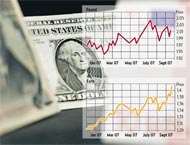Europe to draw up crisis plan as recession deepens
 Berlin - European leaders meet in Berlin Sunday to draw up plans to combat the world economic crisis and revamp the global financial structure amid signs the recession is getting worse.
Berlin - European leaders meet in Berlin Sunday to draw up plans to combat the world economic crisis and revamp the global financial structure amid signs the recession is getting worse.
Hosted by German Chancellor Angela Merkel, Sunday's meeting has been called to set out Europe's position on financial market reform and measures to tackle the recession ahead of the April summit of Group of 20 (G20) of the world's major economic powers in London.
"There is a willingness to revamp international regulation," said Dresdner Kleinwort senior economist Rainer Guntermann. "But it is still fairly unclear where the road is leading."
But Sunday's meeting, which will include the leaders of Britain, France, Italy, the Netherlands and Spain, also risks underscoring the friction within Europe about how to face up to world economy's biggest slowdown in 60 years.
In particular, tensions between the European Union (EU) states have been rising over individual member states' plans for spurring economic growth and aiding struggling national industries.
Nevertheless, the Berlin gathering is also likely to warn about the economic threat posed by protectionism as nations attempt to shield their economies from recession.
At the same time, the leaders meeting in Berlin are also likely to reaffirm their commitment to fighting global warming and renew their call for a drive to reactivate the stalled world trade talks.
Merkel is also keen to raise the question of bonus payments to bankers employed at financial houses hit by the global crisis and now being propped up by state money.
Also attending the gathering in Merkel's Berlin office will be the Czech Republic leaders, which currently hold the EU's six-month rotating presidency, as well Luxembourg Prime Minister Jean-Claude Juncker who as president of the euro group represents the 16-member eurozone.
European Commission President Jose Manuel Barroso and European Central Bank chief Jean-Claude Trichet have also been invited to the Sunday meeting.
In a sense, the Berlin talks will also begin to review the progress made by working groups set up at the G20 summit in Washington, which were charged with drawing up proposals for a radical new blueprint for the world's financial system.
G20 officials were given a deadline of March 31 to hammer out the details of the proposals agreed to in Washington.
This included steps to strengthen global financial transparency, accountability and disclosure measures as well as moves to monitor all major cross-border financial institutions.
Since the Washington meeting, governments around the world have launched a series of big economic stimulus packages and central banks have slashed interest rates in a bid to shore-up economic growth.
But the pressure on leaders around the world is growing in the buildup to the April meeting amid signs of rising unemployment as the recession forces companies to cut production and begin staff layoffs.
Finance Ministers from the Group of Seven (G7) leading industrial states warned at the weekend that the world economy was like to be in the grip of the economic slowdown for the rest of the year.
Indeed, the G20 could present Merkel with the chance to portray herself as a crisis manager playing a key role in tackling the world economic slump as she gears up for what could be a tough election later in the year.
"We've gone from a financial crisis to an economic crisis and now in 2009 it's becoming an unemployment crisis," World Bank chief Robert Zoellick said in Berlin earlier this month.
Unemployment in Britain has already surged to near a 12-year high with eurozone unemployment at its highest level in more than two years. Unemployment in Spain grew by 47 per cent in 2008.
The International Monetary Fund predicts the British economy will contract by 2.8 per cent in 2009 with growth in the eurozone slumping by 2 per cent.
Tensions in the EU flared this month following Paris' plans for supporting its key automakers, with Germany insisting that the rescue package would have to be considered by the European Commission.
The mood in the EU was not helped by French President Nicolas Sarkozy suggesting that French carmakers should relocate their Eastern European plants to France to save French jobs.
At the same time, however, there appears to have been little sign of an easing in the global credit crunch, which has been the heart of the crisis that was triggered about 20 months ago by a meltdown in the US mortgage market.
This is despite the concerted efforts of governments and central banks to boost confidence in the financial markets so as to start credit flowing freely again to companies and households. (dpa)